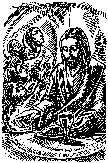Baptized as an infant, my faith journey started long before I became a
committed Christian -- which occurred in the mid 1970s followingtravels with my
cousin Betsey in Europe for two weeks. Until then, the journey had been largely
intellectual. In making a real commitment to a life in Christ, the
journey took on important practical significance.
I remember my grandmother -- a staunchly religious woman -- telling me
stories as a toddler about Jesus. As a child and youth, I learned the fundamentals
of the Christian faith because my parents made sure I partcipated in Sunday School and a
communicants class at age 12 that culminated in my "accepting Jesus Christ as my Lord
and Savior" and becoming a Presbyterian (even though I really didn't understand what
that meant and did so largely because my friends did). I have continued the
denominational affiliation throughout life.
I attended worship services in our family's Presbyterian congregation regularly
through high school, but considered a Christian community unnecessary during my
undergraduate years in college. In college, however, I continued my intellectual
journey in the faith in courses on the Gospels and the theologies of Dietrich Bonhoeffer
and Tieard de Chardin -- studies that have informed my special understanding of
Christianity and my faith.
In New York City, I returned to the institutional Church for a community I
desperately needed in the midst loneliness, angst, and despair related to a life that
centered around my job and a few friends from college who had also located in New
York. As the Church addressed my need for community and a fuller/balanced
life, it also forced me to examine serious questions: Was it possible to believe
this foolishness about God becoming a man, dying on a cross as a sacrifice for the sins of
humankind, and then rising from the dead and ascending into heaven -- triumphing over sin
and death? And if I could believe it, how did I make sense of the words -- as literal fact
or symbols that pointed to a profound, mysterious reality?
Around the same time I was rediscovering the Church as community, I planned a
trip to Europe to travel for two weeks with my cousin -- a French language student who had
been studying in France during the summer of 1974. During her college years,
Betsey -- who would probably still describe herself as a "born again Christian"
-- and I had begun corresponding. A lot of our correspondence revolved around
her newly found Christian faith and its impact on her life. Her enthusiasm and
unquestioned certainty grounded in a Biblical literalism I could not accept both
frightened me and intrtigued me. I tried to challenge her with hard questions.
I wanted to travel with her and have an opportunity to explore more deeply with her
whether or not I could ever be able to accept such simple, but profound faith.
I did not have a Damascus Road experience in Europe in the summer of 1974.
Rather, I went home well into a Kierkagaardian "leap of faith" that
didn't resolve the intellectual questions, but thrust me into a life in Christ that
allowed me to accept the unanswered questions as mysteries beyond human reason.
In practicing the faith, my faith has grown. In the words of
Luther: "To obey is to believe. To believe is to obey." This is how I understand
conversion -- a continuing process, not a sudden dramatic experience.
If there was any sudden turning point on my faith journey, it was the decision
to leap into a life in Christ characterized by doing justice, loving mercy, and walking
humbly with God -- and leaving the intellectual questions behind as secondary issues.
Initially for me, leaping into a life in Christ met committment to a
Christian community that sought to be the resurrected Christ in the world by working for
transformation of society's unjust socio-economic structures as an advocate for decent
affordable housing as a right of all people, schools responsive and responsible to
communities, destruction of nuclear weapons, acceptance of lesbian and gay persons, among
other social issues. As I have grown in the faith, disciplined prayer and
meditation in which I find direction and sustenance for living have become equally
important as my outward journey as a mission-oriented disciple of Christ.
Theologically, I have come to understand God as the essential Love that is the
ground of all being and that through grace, as we believe, we experience as acceptance in
spite of our flawed natures; Jesus the Christ as the historical incarnation of this
essential Love who through his life and teachings showed us how to live and enjoy creation
as the Creator intended -- namely, by doing justice, loving kindness, and walking
humbly with God; the Holy Spirit as the empowering presence of God that surrounds us and
enables us to live as God requires. In the mystery of the resurrection, we have
proof that God's intention for creation prevails -- for Christ, indeed, lives in spite of
his unjust crucifixion caused by the sin of humankind.
